A Roundtable Discussion With Miranda July (THE FUTURE)
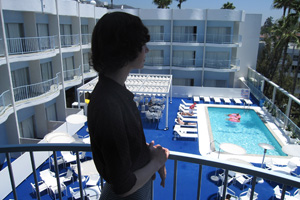 We’re on the third floor of the Hollywood Standard Hotel, which feels appropriate. Densely and meticulously designed, it’s like a fantasy version of L.A. dreamed up in Milan or Tokyo. Like Miranda July, it lives in L.A. without really being of L.A.
We’re on the third floor of the Hollywood Standard Hotel, which feels appropriate. Densely and meticulously designed, it’s like a fantasy version of L.A. dreamed up in Milan or Tokyo. Like Miranda July, it lives in L.A. without really being of L.A.
July first built a reputation with her dark and surreal multimedia performance-art pieces. Though she’s not exactly a household name, her first film Me and You and Everyone We Know made her an iconic star in certain circles, and there’s a charge of excitement among the small panel of journalists waiting to speak to her. The anticipation of a big reveal crumbles as someone who we suddenly realize is July appears unassumingly in the front room, concerned about how the next piece of her press day will unfold. It feels incongruous, but here she is with her short, 1930s, curly-at-the-ends hair, and her retro schoolteacher sharp skirt and silk blouse. As we settle into the (rectangular) roundtable, she makes sure we know that we really can talk about anything. “That said, do not be afraid to ask your prepared questions,” she adds, kind of like one of the disembodied bureaucratic entities from her performances.
Up close, her eyes are extraordinary, blue around the edge and icy-white around the pupil, as if freezing what she sees in order to capture it precisely. There’s nothing casual about her—her intellect is free-ranging, as you’d expect, but she takes each question and rigorously parses and processes it until it’s well and thoroughly answered. She’s friendly without being particularly warm. Her speaking style has strong vestiges of California teenager—a slight drawling whine, and a liberal use of “like,” “you know,” “kinda” and “sorta,” which gives a homey, relatable texture to the elevated concepts she gets into.
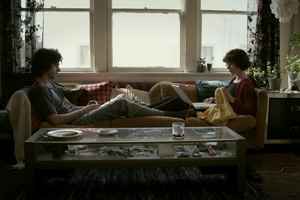 Her new film, The Future, is about a 30-something couple, Sophie and Jason, that decide to adopt a sick cat named Paw Paw, who will require constant care. They try to focus on what’s really important in life, in their last days of freedom from responsibility. The film is structured around a series of monologues in which Paw Paw (seen only in close-ups of his animatronic paws) narrates his own parallel reality. It builds on the themes of Me and You and Everyone We Know, with a similar, wildly imaginative scope and sense of humor, but it also strays into much darker territory. July acknowledges taking a risk, playing a character who’s at times grotesque, needing constant attention like a child. “Yeah, doing it was also just sort of embarrassing,” she says, “and the whole time I was just like—this is just—I’m just throwing myself to the lions here, this is so, you know, uncharming as far as things to do, but I also felt like—I guess that I’ve built up a fair amount of charm points with the last movie, and why not spend them on that, rather than just buy more charm, you know?”
Her new film, The Future, is about a 30-something couple, Sophie and Jason, that decide to adopt a sick cat named Paw Paw, who will require constant care. They try to focus on what’s really important in life, in their last days of freedom from responsibility. The film is structured around a series of monologues in which Paw Paw (seen only in close-ups of his animatronic paws) narrates his own parallel reality. It builds on the themes of Me and You and Everyone We Know, with a similar, wildly imaginative scope and sense of humor, but it also strays into much darker territory. July acknowledges taking a risk, playing a character who’s at times grotesque, needing constant attention like a child. “Yeah, doing it was also just sort of embarrassing,” she says, “and the whole time I was just like—this is just—I’m just throwing myself to the lions here, this is so, you know, uncharming as far as things to do, but I also felt like—I guess that I’ve built up a fair amount of charm points with the last movie, and why not spend them on that, rather than just buy more charm, you know?”
She traces the evolution of the film from Things We Don’t Understand And Definitely Are Not Going To Talk About, the multimedia performance that spawned it: “I did always think it would end up as a film, but I thought it was going to be a really new kind of film that might, like the performance, involve audience participation, and therefore would not be distributed in any of the normal ways, and might even have like a web component, ‘cause this was me thinking—well I made a movie, I made a normal movie that, like, happened in a normal way; why do that again? I wanna make movies but why repeat that? And I think the answer why came after doing something wild enough that I kinda got all that desire—I was satisfied, and then I think the thing that compels me to make movies came back and it just suddenly felt like the most interesting way to tell that story. And like then, in a way, the surreal elements, a lot of which were in the performance, might be more interesting in a more conventional context if I could pull that off. That became the challenge.”
H2N: Your performance work is obviously so different from your film work—your films sort of speak the language of indie film—how do you marry those or how do you choose to marry those two?
MJ: Well I’m not thinking that much—whatever genre I’m in, I’m not really thinking that much about the language of the genre. Especially with film, I mean my cinematic references are pretty few and far between, although I like to watch movies. So I think I’m mostly concerned with, you know, how do I show—what is really necessary to show? Especially like an inner world. And then to just try and be as free as possible about that; to remember—sometimes I write down on a post-it, I’ve re-written this many times: to “move in symbols,” because when I start to get too literal or heaven forbid autobiographical, which is always like certain death for me, it just gets bad. And then if I let go and realize, like, you know this thing can hold the feeling, no one has to enact that feeling even, you can just see it, you know? Time can just stop, and that’s how you know what’s inside him.
H2N: It seemed like the film and the way you wrote it had a sense of an impending apocalypse, or an end of life as we know it. Is that something you wrote in the context of the movie and the relationship, or is it something that you felt on a larger scale?
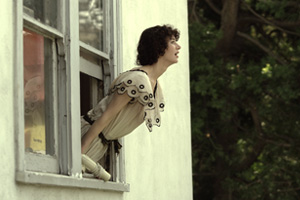 MJ: Well I mean it is very much about sort of beginnings and endings, and the end of a beginning, and that language is used—the only place I specifically refer to, like, life itself is that wrecking ball scene, and that was something almost apart from—I mean it fits in very nicely with all the themes of time, but even apart from the movie, I was struck, kind of in the last few years, by the fact that my sense of our future, the human future, had really changed like in the last ten years, or at least since I was a child. I’d gone from thinking that this life that we know would go on forever to thinking like no, probably we’ve fucked it up, you know? And I don’t know about that, I’m not a scientist, but whether or not that’s true, that’s kind of a big thing to have shift without ever actually even noticing it happen. Just gradually, a shifting sort of consciousness. And that mirrors a lot of other themes in the movie, so it seemed worthwhile to put in there.
MJ: Well I mean it is very much about sort of beginnings and endings, and the end of a beginning, and that language is used—the only place I specifically refer to, like, life itself is that wrecking ball scene, and that was something almost apart from—I mean it fits in very nicely with all the themes of time, but even apart from the movie, I was struck, kind of in the last few years, by the fact that my sense of our future, the human future, had really changed like in the last ten years, or at least since I was a child. I’d gone from thinking that this life that we know would go on forever to thinking like no, probably we’ve fucked it up, you know? And I don’t know about that, I’m not a scientist, but whether or not that’s true, that’s kind of a big thing to have shift without ever actually even noticing it happen. Just gradually, a shifting sort of consciousness. And that mirrors a lot of other themes in the movie, so it seemed worthwhile to put in there.
H2N: When you talk about the shift in consciousness that you’ve experienced, what about—the film’s so much about the influence of the internet and being connected and visible all the time. How do you see that really shifting people’s consciousness, even like for kids growing up now?
MJ: I know, it’s pretty mind boggling, that we’re all alive in this time where things change so much. And now, you know, I didn’t foresee that for my whole adult life or almost all of it I would be, like, checking something again and again and again throughout the day, I mean, like a maniac. You know, you have visions of your adulthood and that would’ve seemed so weird to me if someone had told me that. That doesn’t seem good, and yet it does tie in so much to a part of me that obviously everyone else has…
Suddenly there’s a loud rumble, and the building vibrates—probably just a large semi driving by, but you never know. July’s facial expression doesn’t read fear, but her distress is palpable. “Was that an earthquake?” she asks. “I’m so afraid of earthquakes…” We try to reassure her, without being 100% sure ourselves. “I guess getting under the table would be the thing, but we’re not going to all fit,” she says, dead serious. She looks out at the sunbathers on the Standard’s electric-blue Astroturf. “They seem pretty mellow out there…” We all laugh.
MJ: What was the question? The Internet, right. So I mean my own desire for that hit, like what used to be the letter in the P.O. Box that I would check like way more than letters actually came, and now I just check my email more than I actually need to, it’s such a human thing. I mean of course, what a potent territory to occupy, it’s just limitless and it’s self-perpetuating, like the more you do it the more you wanna do it, so it’s kind of every man, every person for himself as far as wrestling with it and self-preservation. You know, which is not to say it’s clear-cut, I mean it’s very useful too.
H2N: What about Sophie and Jason’s relationship—it seems like their connection is very cerebral and then she goes off and she has this sexual, physical experience. When she comes back he tells her “there’s nothing here anymore.” Why is that if they have this intense connection?
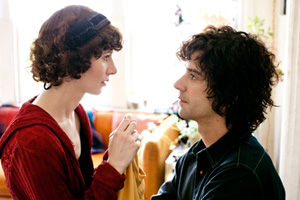 MJ: I think he’s saying like what I’ve been through since you left, it would be a joke to think that we’re picking up from where we left off, like we have to start over from nothing. That was what that meant to me. I mean he doesn’t actually say we have to start over, that’s more, that would be nice… -er if he suggested that. I think sometimes there is, in the beginning of a long relationship, this point where it almost ends. It’s either gonna end or it’s gonna be for real from now on, because you wonder—it’s like, there’s that “end of the beginning” thing I think is a real thing. I’ve talked to other people and I’ve felt it myself. Was that, was there another part to that question?
MJ: I think he’s saying like what I’ve been through since you left, it would be a joke to think that we’re picking up from where we left off, like we have to start over from nothing. That was what that meant to me. I mean he doesn’t actually say we have to start over, that’s more, that would be nice… -er if he suggested that. I think sometimes there is, in the beginning of a long relationship, this point where it almost ends. It’s either gonna end or it’s gonna be for real from now on, because you wonder—it’s like, there’s that “end of the beginning” thing I think is a real thing. I’ve talked to other people and I’ve felt it myself. Was that, was there another part to that question?
H2N: Just the sort of contrast between this very cerebral connection and the sensual…
It’s funny, that wasn’t so—you know movies, by the time they’re edited and stuff, it’s like they get a little simpler. You begin to realize there’s a lot of complicated stuff in here without having every subtlety, and I had shot a sex scene between Sophie and Jason. We fully prepared for it, did it. It turned out way pornier than I had … [laughter] Oh my god, no one will ever see that. Honestly like when I saw the first assembly and the editor had dutifully cut it together I was like, “Okay, I am never watching that again.” I don’t know how you accidentally make an X-rated movie, but we did. I mean not—that’s gonna sound weird—it’s not technically X-rated. And I guess, you know, it’s so like—part of me wanted to show that part of a relationship that’s four years in, like that seemed like a great challenge, that sex, versus the sex she has with him [Marshall], but I failed. It didn’t work and it wasn’t the best way to tell the story, you know. It was like a detour, which ended up making them even more siblingy, which I just kinda had to embrace, yeah.
H2N: When she says to Marshall she didn’t realize she was the kind of person who would know what his necklace meant…
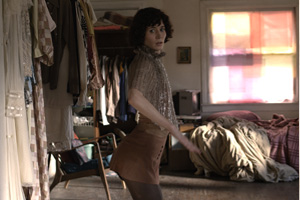 MJ: Yeah and I guess I also, you know how you think of yourself sexually, it’s like you have your, especially your inner relationship, you have your way that you think of yourself. And if you’re in a stranger’s world like that, none of that matters, you know? Like to them you don’t come with all these things that are “your way,” you know? It’s all wide open, so that freedom too of like “oh maybe I’m this person,” you know? It’s not—I wanted to show the kind of light-headed space of that too. It is sort of self-sabotaging, the whole thing, but that’s not to say in the moment of it there’s not something, really, that’s kind of a relief. To not have to be the self that you’ve already determined, that feels so determined within a relationship.
MJ: Yeah and I guess I also, you know how you think of yourself sexually, it’s like you have your, especially your inner relationship, you have your way that you think of yourself. And if you’re in a stranger’s world like that, none of that matters, you know? Like to them you don’t come with all these things that are “your way,” you know? It’s all wide open, so that freedom too of like “oh maybe I’m this person,” you know? It’s not—I wanted to show the kind of light-headed space of that too. It is sort of self-sabotaging, the whole thing, but that’s not to say in the moment of it there’s not something, really, that’s kind of a relief. To not have to be the self that you’ve already determined, that feels so determined within a relationship.
July has spoken extensively about having a kind of compulsion to be creative all the time, how it’s tied up with her very identity, and while she’s thoroughly interested and engaged in speaking about The Future, her intensity shoots up several notches when she talks about her next project. “Last night I was kind of—I have gotten very little sleep ‘cause I was like spinning, kind of for the first time in a while, like this new… ‘New Project’ [laughs] and I don’t think it’s that it feels—it’s more like I’m thinking ‘Aaahhh maybe I can get at this thing that is almost like an itch that I’ve been carrying around for so long. Maybe I can get it back in a way that’s going to free me, going to like lead me to a new place that I don’t even know about yet.’ That’s more the intoxication, yeah. Kinda like that.”
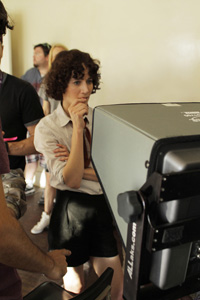 The project will be a novel. “I have a whole performance idea that I wrote out that’s waiting, that I know is a performance. This one last night, I think I’ve been going back and forth on it being a movie or a book, a fiction book—the movie probably ‘cause I really would like to make another movie right now but then I’m just a filmmaker and I really wanna be a writer too, like I’m really at a very novicey place in terms of writing. I have this one book of short stories. I’m really curious to see if I could write a novel, so I gotta do that and like take the time. So I began really thinking of it as a novel last night, more than a movie, and I realized ‘Aahhh that’s better for all these reasons.’ I suddenly could see and feel and was excited about it… I mean those short stories, a lot of them—those were like the first things I ever seriously wrote as fiction, so when one came I would write it, and pretty quick, and I realize now looking back—I’d write the bulk of it in like three sittings over three days or something. That changed near the end of that book, once I had a publisher and they needed to have a few more stories. The longer stories are the kind of ones I did last and they were after I finished the movie, and I think the good thing was I had a wider scope and I knew I could take on more, but the, like, “lightning strikes” stuff was no longer what it was all about, you know? The having the flash of an idea. It was more about the discipline of it, and if there was lightning that was fine, which is ‘the writer’s life,’ you know. I think it’s only in the beginning that you’re like ‘wow, this is…’”
The project will be a novel. “I have a whole performance idea that I wrote out that’s waiting, that I know is a performance. This one last night, I think I’ve been going back and forth on it being a movie or a book, a fiction book—the movie probably ‘cause I really would like to make another movie right now but then I’m just a filmmaker and I really wanna be a writer too, like I’m really at a very novicey place in terms of writing. I have this one book of short stories. I’m really curious to see if I could write a novel, so I gotta do that and like take the time. So I began really thinking of it as a novel last night, more than a movie, and I realized ‘Aahhh that’s better for all these reasons.’ I suddenly could see and feel and was excited about it… I mean those short stories, a lot of them—those were like the first things I ever seriously wrote as fiction, so when one came I would write it, and pretty quick, and I realize now looking back—I’d write the bulk of it in like three sittings over three days or something. That changed near the end of that book, once I had a publisher and they needed to have a few more stories. The longer stories are the kind of ones I did last and they were after I finished the movie, and I think the good thing was I had a wider scope and I knew I could take on more, but the, like, “lightning strikes” stuff was no longer what it was all about, you know? The having the flash of an idea. It was more about the discipline of it, and if there was lightning that was fine, which is ‘the writer’s life,’ you know. I think it’s only in the beginning that you’re like ‘wow, this is…’”
***WARNING: SPOILERS AHEAD***
The idea for The Future was sparked by a real-life incident. “I did see a stray cat in the neighborhood get hit by a car and that was this moment of, it felt like part of what I was making in a really tragic way, you know, like not cutely at all, in a really sad way and I think especially— like if it’s a stray cat and I’m the one that ends up burying it and stuff… you realize ‘oh, there’s no—this story is gone,’ like no one knows, no one’s gonna mourn this cat, so that was kind of my starting place, sort of working backwards from there. And then I’m putting all kinds of heart-on- the-sleeve emotional content into that cat because it is so artificial to begin with that I felt free to do that, in a way that I wouldn’t with a human character maybe… There was a point where I had been more explicit about the death believe it or not, more like ‘how does a cat get killed at a shelter?’ And I realized, at the point where I was doing sort of test screenings with friends of friends in the audience, like it was such a victory at the point where everybody suddenly cared if the cat lived or died, ‘cause I re-wrote that monologue and re-recorded it a million times before I shot the final cat paws, and at that point, where I felt like I’d earned people’s empathy through the writing working, I was like ‘Okay and now I need to really take this death, really consider what this means and what is the sort of highest thing I could go for.’ And it was hard, like how do you write about what’s the monologue after you die? I wrote so many versions of that, it was the last thing I did on the whole movie, recording that monologue, and yeah I guess that was the challenge to sort of honor that people cared.
H2N: What about at the end of the movie, the whole idea that life itself is just a beginning and that what comes next is sort of “light”—can you talk more about that?
MJ: Well, yeah I mean that idea, you know, the original line which Joe says, “You’re just in the middle of the beginning right now,” that wasn’t how I wrote it, that was just how Joe said it. The line was more boring, it was “You’re just at the beginning,” something like that, so once I was given this idea of a beginning having a beginning, middle and end—it seemed like I could carry that through to Paw Paw, and that, while no one would know if I was wrong about what happens after death, I felt very sure that if it wasn’t true everyone would just smell it, you know, like if there wasn’t something—a little bit true? So that’s my best guess, that it’s really, it’s—yeah, it’s the end of this one thing but that once you’re there on the other side you can see, and then you’re probably not you. I mean he says—I don’t remember the line, but like “I” goes away. Once you’re there on the other side, it seems very much like the beginning, this whole thing that you did, as a physical, human… and that it’s okay, you know, that there’s some kind of—not relief, but it’s just totally appropriate that you’re now in this next part. I mean, whoa—that’s, like, hard. It’s very challenging to go out on a limb on that, but it’s pretty interesting to try.
—Paul Sbrizzi








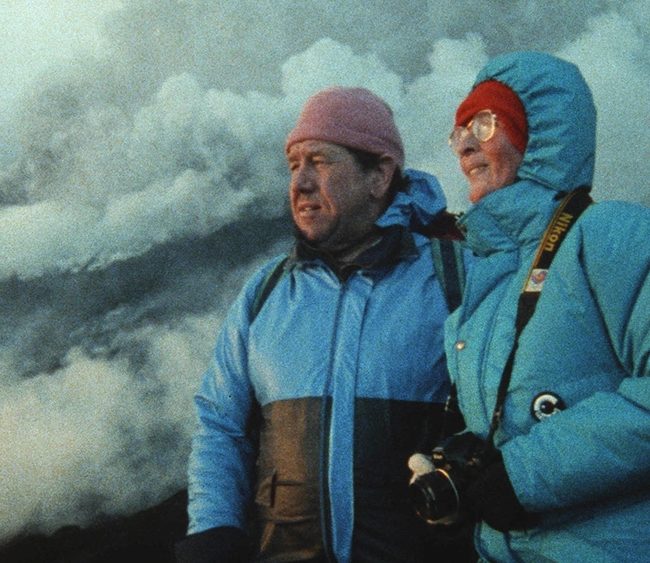
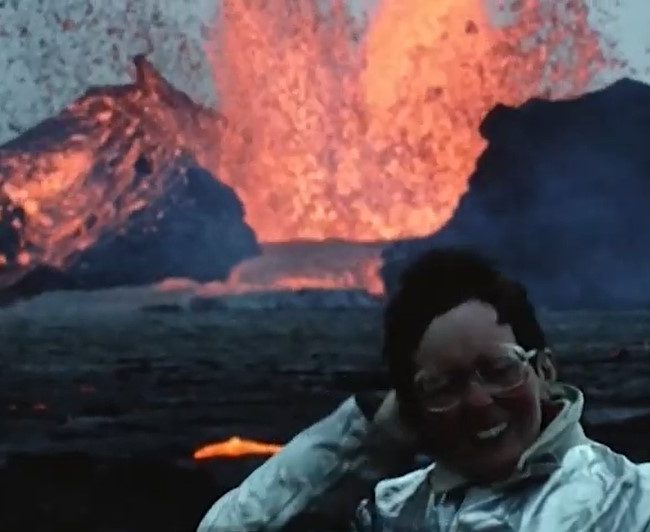


Pingback: HOME VIDEO PICKS – Hammer to Nail